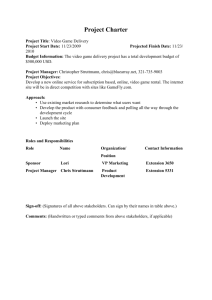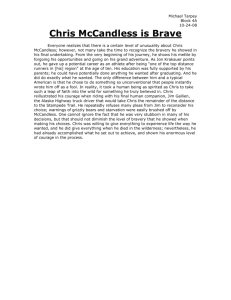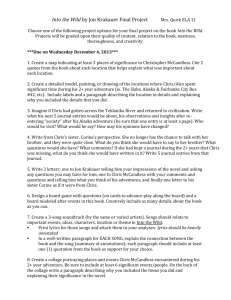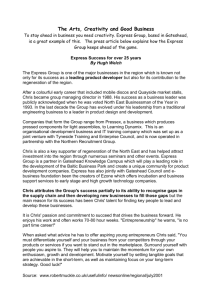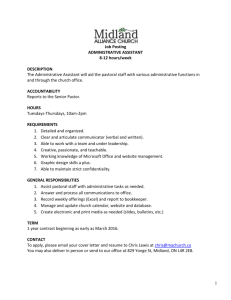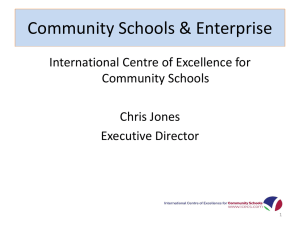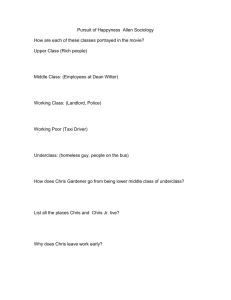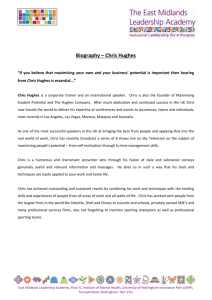Into the Wild Paper Graphic Organizer
advertisement
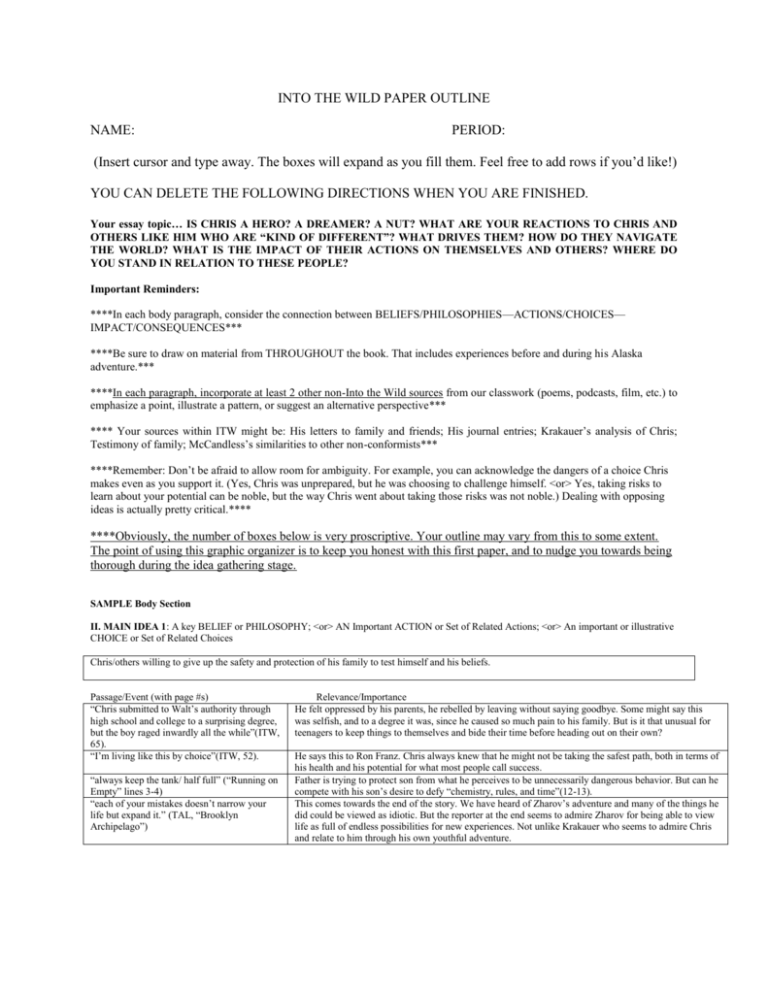
INTO THE WILD PAPER OUTLINE NAME: PERIOD: (Insert cursor and type away. The boxes will expand as you fill them. Feel free to add rows if you’d like!) YOU CAN DELETE THE FOLLOWING DIRECTIONS WHEN YOU ARE FINISHED. Your essay topic… IS CHRIS A HERO? A DREAMER? A NUT? WHAT ARE YOUR REACTIONS TO CHRIS AND OTHERS LIKE HIM WHO ARE “KIND OF DIFFERENT”? WHAT DRIVES THEM? HOW DO THEY NAVIGATE THE WORLD? WHAT IS THE IMPACT OF THEIR ACTIONS ON THEMSELVES AND OTHERS? WHERE DO YOU STAND IN RELATION TO THESE PEOPLE? Important Reminders: ****In each body paragraph, consider the connection between BELIEFS/PHILOSOPHIES—ACTIONS/CHOICES— IMPACT/CONSEQUENCES*** ****Be sure to draw on material from THROUGHOUT the book. That includes experiences before and during his Alaska adventure.*** ****In each paragraph, incorporate at least 2 other non-Into the Wild sources from our classwork (poems, podcasts, film, etc.) to emphasize a point, illustrate a pattern, or suggest an alternative perspective*** **** Your sources within ITW might be: His letters to family and friends; His journal entries; Krakauer’s analysis of Chris; Testimony of family; McCandless’s similarities to other non-conformists*** ****Remember: Don’t be afraid to allow room for ambiguity. For example, you can acknowledge the dangers of a choice Chris makes even as you support it. (Yes, Chris was unprepared, but he was choosing to challenge himself. <or> Yes, taking risks to learn about your potential can be noble, but the way Chris went about taking those risks was not noble.) Dealing with opposing ideas is actually pretty critical.**** ****Obviously, the number of boxes below is very proscriptive. Your outline may vary from this to some extent. The point of using this graphic organizer is to keep you honest with this first paper, and to nudge you towards being thorough during the idea gathering stage. SAMPLE Body Section II. MAIN IDEA 1: A key BELIEF or PHILOSOPHY; <or> AN Important ACTION or Set of Related Actions; <or> An important or illustrative CHOICE or Set of Related Choices Chris/others willing to give up the safety and protection of his family to test himself and his beliefs. Passage/Event (with page #s) “Chris submitted to Walt’s authority through high school and college to a surprising degree, but the boy raged inwardly all the while”(ITW, 65). “I’m living like this by choice”(ITW, 52). “always keep the tank/ half full” (“Running on Empty” lines 3-4) “each of your mistakes doesn’t narrow your life but expand it.” (TAL, “Brooklyn Archipelago”) Relevance/Importance He felt oppressed by his parents, he rebelled by leaving without saying goodbye. Some might say this was selfish, and to a degree it was, since he caused so much pain to his family. But is it that unusual for teenagers to keep things to themselves and bide their time before heading out on their own? He says this to Ron Franz. Chris always knew that he might not be taking the safest path, both in terms of his health and his potential for what most people call success. Father is trying to protect son from what he perceives to be unnecessarily dangerous behavior. But can he compete with his son’s desire to defy “chemistry, rules, and time”(12-13). This comes towards the end of the story. We have heard of Zharov’s adventure and many of the things he did could be viewed as idiotic. But the reporter at the end seems to admire Zharov for being able to view life as full of endless possibilities for new experiences. Not unlike Krakauer who seems to admire Chris and relate to him through his own youthful adventure. I. INTRODUCTORY IDEAS: A) Provoke your reader’s thinking. What are some key connections? (risk-takers? rebellion? individuality? nature?) and B) state your position (Chris and others like him are _____ people… While Chris and others like him are noble because of…… ultimately they are fools for…. <or> While Chris and others might have gone too far by… ultimately I value their…) II. MAIN IDEA 1: A key BELIEF or PHILOSOPHY; <or> AN Important ACTION or Set of Related Actions; <or> An important or illustrative CHOICE or Set of Related Choices Passage/Event (with page #s) Relevance/Importance III. MAIN IDEA 2: A key BELIEF or PHILOSOPHY; <or> AN Important ACTION or Set of Related Actions; <or> An important or illustrative CHOICE or Set of Related Choices Passage/Event (with page #s) Relevance/Importance IV. MAIN IDEA 3: A key BELIEF or PHILOSOPHY; <or> AN Important ACTION or Set of Related Actions; <or> An important or illustrative CHOICE or Set of Related Choices Passage/Event (with page #s) Relevance/Importance V. MAIN IDEA 4: A key BELIEF or PHILOSOPHY; <or> AN Important ACTION or Set of Related Actions; <or> An important or illustrative CHOICE or Set of Related Choices Passage/Event (with page #s) Relevance/Importance V. CONCLUDING IDEAS: (What have you discovered about Chris McCandless and others like him? What are some final points you’d like to make about Chris (and others)? Is there a quote or passage from a source that best captures these final ideas?

